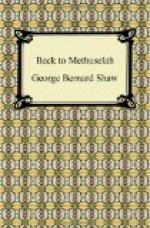knows why: all we know is that the thing actually
takes place. We relapse miserably from effort
to effort until the old organ is modified or the new
one created, when suddenly the impossible becomes
possible and the habit is formed. The moment
we form it we want to get rid of the consciousness
of it so as to economize our consciousness for fresh
conquests of life; as all consciousness means preoccupation
and obstruction. If we had to think about breathing
or digesting or circulating our blood we should have
no attention to spare for anything else, as we find
to our cost when anything goes wrong with these operations.
We want to be unconscious of them just as we wanted
to acquire them; and we finally win what we want.
But we win unconsciousness of our habits at the cost
of losing our control of them; and we also build one
habit and its corresponding functional modification
of our organs on another, and so become dependent
on our old habits. Consequently we have to persist
in them even when they hurt us. We cannot stop
breathing to avoid an attack of asthma, or to escape
drowning. We can lose a habit and discard an organ
when we no longer need them, just as we acquired them;
but this process is slow and broken by relapses; and
relics of the organ and the habit long survive its
utility. And if other and still indispensable
habits and modifications have been built on the ones
we wish to discard, we must provide a new foundation
for them before we demolish the old one. This
is also a slow process and a very curious one.
THE MIRACLE OF CONDENSED RECAPITULATION
The relapses between the efforts to acquire a habit
are important because, as we have seen, they recur
not only from effort to effort in the case of the
individual, but from generation to generation in the
case of the race. This relapsing from generation
to generation is an invariable characteristic of the
evolutionary process. For instance, Raphael,
though descended from eight uninterrupted generations
of painters, had to learn to paint apparently as if
no Sanzio had ever handled a brush before. But
he had also to learn to breathe, and digest, and circulate
his blood. Although his father and mother were
fully grown adults when he was conceived, he was not
conceived or even born fully grown: he had to
go back and begin as a speck of protoplasm, and to
struggle through an embryonic lifetime, during part
of which he was indistinguishable from an embryonic
dog, and had neither a skull nor a backbone.
When he at last acquired these articles, he was for
some time doubtful whether he was a bird or a fish.
He had to compress untold centuries of development
into nine months before he was human enough to break
loose as an independent being. And even then he
was still so incomplete that his parents might well
have exclaimed ’Good Heavens! have you learnt
nothing from our experience that you come into the
world in this ridiculously elementary state?




